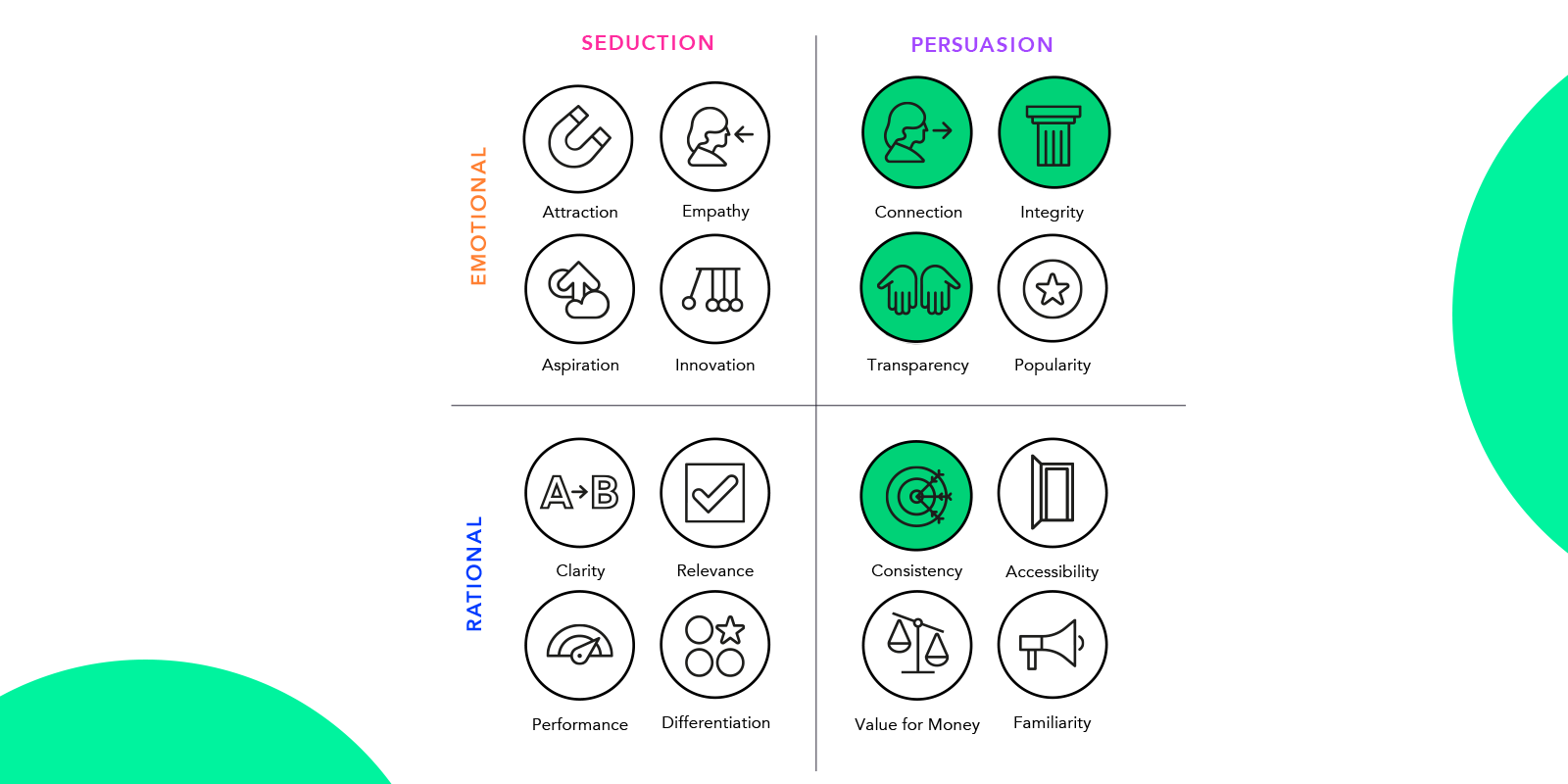Posted on July 30, 2021
Updated on April 11, 2023
5 min read time

Consumers vote with their money. And brands are one of the hottest commodities out there, just waiting to be voted on. Yet, in a world of competitive convergence, with so many identical companies out there to choose from, how can any brand truly stand out from the pack?
Purposeful marketing is the answer. Brands that stand for meaningful causes will find it easier to create an emotional connection with their consumers, as consumers are drawn towards brands that share their values. Once an emotional connection has been established, the opportunities for growth are endless. This is because humans are more likely to buy a brand if they feel a strong emotional connection to it. In fact, 90% of purchasing decisions are driven by our system 1 responses, our emotionally driven, instinctive responses. That’s why tapping into emotions is so important when trying to differentiate your brand.
The concept of ‘inclusion’ is fast becoming a hygiene factor in the brand world, with 61% of Americans believing diversity in advertising is important. Yet so many companies are still doing it poorly.
If you want to learn how to pull off purposeful marketing to improve your customer relationships, and if you’re keen to avoid the ultimate pitfall, of ‘being cancelled’, keep on reading.
Inclusive brands walk the walk. They live and breathe their social causes, and this is evident through all of their actions. Not only do they feature inclusive voices externally through advertisements and products, but they’ve also created inclusive cultures at work, are catering towards a diverse range of customers and regularly give back to communities that support the same mission.
In contrast, brands that fail at purposeful marketing often react quickly to causes, jumping on the bandwagon but not providing evidence to substantiate why they are joining the cause. Consumers will easily see through these actions, and that’s where mistrust can develop.
When you start to leverage purpose for brand building, you put yourself under a microscope, leaving your brand open to judgment from customers. Largely speaking, customers are always looking for incongruities to call out, as on the whole, there is a common mistrust towards brands. People may not necessarily believe brands have their best interests at heart, as chasing profit is often thought of as a priority, especially for multi-national brands. The greater the disparity between a brand and its chosen cause, the less believable it will be for consumers.
Download our guide to building a brand people fall in love with.
An example of a marketing misstep is L’Oréal Paris who made a supportive statement in June 2020 on the Black Lives Matter movement, which totally contradicted the brand’s previous behavior to date. They were immediately called out by model, Munroe Bergdorf, who pointed out the company had severed ties with her after she spoke out about white privilege in 2017. Here we see a case of a brand jumping on the bandwagon, supporting a cause without properly integrating it into their company values, culture, and behavior first.

To make amends for their error, L’Oréal rehired Bergdorf, creating a role within their advisory board, as well as donating £45,000 to two LGBT+ charities.
But the days of apologies and empty promises are coming to an end. Customers are tiring of companies ‘talking the big talk’ and are looking for businesses that are committed to the causes they preach. There’s now a huge demand for brands that are ‘putting in the work’.
Brands that do purposeful marketing well care about the causes and issues they support. These causes are usually closely associated or adjacent to their existing mission.
A brand that got it right during the 2020 anti-racism movement in America was Ben & Jerry’s. While hundreds of brands were cautiously taking a stand for the first time, Ben & Jerry’s knew what to do.
The brand is no stranger to socially responsible marketing and has baked equality into their brand from day one. When they took a stand on Black Lives Matter, customers knew it was genuine and authentic, as it closely aligned with previous brand behavior.

Not only did it reflect the brand’s values but the brand itself has also actively been involved in the cause for many years. While other brands were busy posting black squares on their Instagram, Ben & Jerry’s marketing cut through the noise, encouraging Americans to ‘dismantle white supremacy’ and ‘grapple with the sins of our past’. They had permission to be bold and provocative in their response because these values have been baked into the brand’s DNA.
In an overly saturated market, where brands struggle to differentiate themselves on a product or function basis, competing on practical benefits simply isn’t enough. Brands need to go a step further, spending time on creating an emotional connection. Purpose can help with this, enabling brands to create stronger emotional ties with their customers.
At ProQuo, informed by neuroscience and the rigorous study of over 1,000 brands, we’ve developed a system of brand analysis. It starts from an understanding that, beyond simply delivering functionality, the brands that succeed are always the ones with the strongest relationships.
We’ve proven the strength of a brand’s relationship is made up of its performance across 16 Drivers of Relationships. These Drivers determine whether a consumer feels they have a positive quid pro quo with a brand, and they range from Consistency – if a customer feels a brand is acting reliably the same throughout all of their interactions - to Accessibility, how easy and intuitive they feel a brand’s product/service is to use.
Here are the Drivers that are fundamental for purposeful marketing:

Transparency is imperative for socially responsible marketing, as in order to be taken seriously, you have to be open about how you behave. To build trust and authenticity, you need to demonstrate how your behavior is either supportive or detractive of a certain cause, and how this is being lived and breathed throughout your company.
Consistency is the facilitating Driver here and is necessary to achieve high levels of Transparency. Show consistently throughout all your communications and actions how you live up to your status as an open and transparent company.
Integrity is the pay-off of the above Drivers. When a brand is seen to be doing the right thing, they benefit from a big boost of Integrity. But in order to achieve this, you need Transparency to prove your actions are genuine.
Connection is also important here, as if you’re investing in a purpose that no one cares about, you won’t reap the emotional benefit you’re after. Since purpose marketing is all about building an emotional connection with customers, you need to make sure to utilize the Connection Driver, checking your cause is rooted in what your customers want, need and care about.
The right purpose will be linked to your proposition, category, and to the people you’re serving. There needs to be a clear intersection between the values you espouse internally and what your customers are looking for. That’s why the purpose you choose needs to come from within, fully integrated into your company culture and evident throughout all of your business processes.
Purpose and profit don’t always go hand in hand. To pull off purpose, you need a positive ‘quid pro quo’, where the relationship exchange is in the customer’s favor. The customer needs to get more out of the relationship than the brand does.
Yet, brands engaging with purpose will gain so much more than profit. Purpose is a great vehicle for storytelling, and is essential for building an emotional connection, as it enables people to understand your brand on a deeper level.
Often, this can be a generational thing, with younger generations demanding purpose from their brands and older generations prioritizing functionality over purpose. It’s likely we will start to see a divergence between brands, with Gen Z and millennial brands taking bigger risks, and institutional brands taking slower steps to avoid alienating their existing audiences.
Yet, in today’s socially conscious world, with more and more brands fighting for space within crowded categories, the role of purpose is evolving. No longer is it a ‘nice to have’. It’s fast becoming a necessity - an essential for any company looking to future proof their brand.
To see how other brands are executing purpose successfully, check out our Brand Integrity Index.
Our intelligent platform will take your brand further, faster.
Don’t believe us?
© 2020-2023 ProQuo AI International
All rights reservedWebsite by Blend